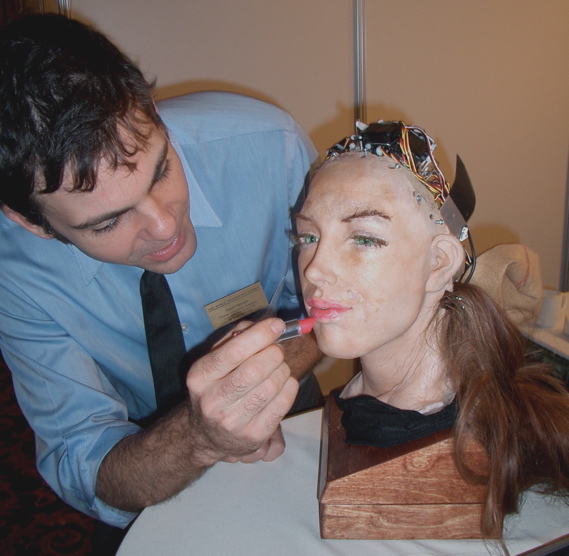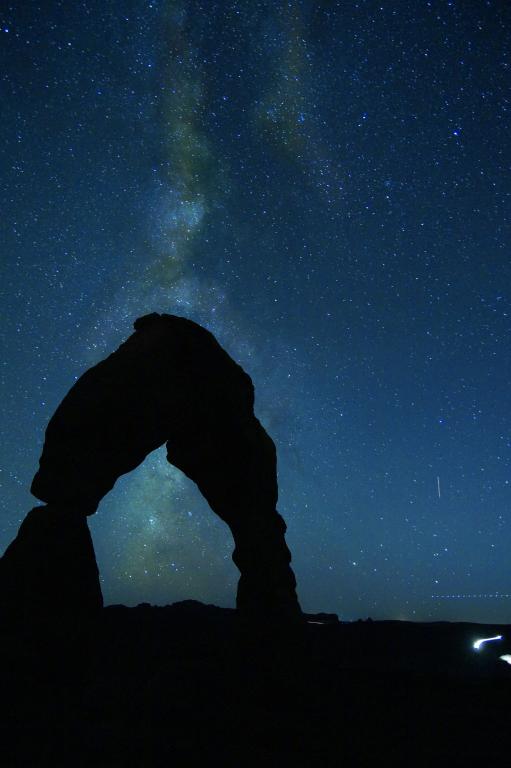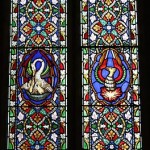David Russell Mosley

A robot by Human Emulation Robotics. Lipstick is carefully applied by the designer — easier when the power is off. She frowns and shakes her head if you get too close.
Date 8 October 2004, 11:46:20
Source Flickr
Author Steve Jurvetson from Menlo Park, USA
Reviewer Greudin
(CC BY 2.0)
Ordinary Time
6 February 2017
The Edge of Elfland
Hudson, New Hampshire
Dear Readers,
The other day over at The Atlantic, they ran a piece entitled, “Is AI a Threat to Christianity?” The piece began by examining Pope Francis’ statement about what he’d do if Martians came to him looking for salvation, but the piece quickly moves from other organic life to the rise of the machines. I was not impressed by this piece, I am sorry to say. It seems to have gotten several facts and ideas wrong about the soul, prayer, and science in the Christian tradition. So, I thought I would respond to those three particular points as they appear in the article.
The Soul
The first issues when dealing with “the singularity” (the rise of consciousness within machines) are of course issues of soul, mind, and consciousness. I’ll focus primarily on the soul since that is usually seen as the more “religious” concept (that’s nonsense, of course and I’ll show why in a moment).
Merritt, the author of the piece, for instance, notes:
Take the soul, for instance. Christians have mostly understood the soul to be a uniquely human element, an internal and eternal component that animates our spiritual sides. The notion originates from the creation narrative in the biblical book of Genesis, where God “created human beings in God’s own image.” In the story, God forms Adam, the first human, out of dust and breathes life into his nostrils to make him, literally, “a living soul.” Christians believe that all humans since that time similarly possess God’s image and a soul. (my emphasis)
Note the words I have put in bold. Merritt seems to be missing the fact that animate comes to us from the Latin animus which means soul. In fact, Merritt seems to have a rather gnostic understanding of the soul. For many, if not all, Christians, the soul, while being the seat of reason, is also our animating force. Put another way, the difference between a human being and a human corpse is the presence or absence of a soul. By this understanding, anything that moves on its own has a soul. What Genesis is talking about is what differentiates humans from other creatures with souls, like plants and animals. What that is––which is usually called the imago dei––includes many things like rationality, relationality, dominion over creation, creativity, etc. So, for a robot to have a soul of the kind the author of this piece is speaking, it would first need the kind of soul had by an animal or a plant.
Merritt then goes on to quote Augustine as an authority who says we don’t know precisely what souls are. The quote he cites is this, “I have therefore found nothing certain about the origin of the soul in the canonical scriptures.” Of course, what Augustine actually means here is the Scriptures are not clear whether God creates each soul new and places it in an unborn child or whether the soul is created by the conception process as such (Letter 190). So, if we were to apply what Augustine is saying in Letter 190 to the question of robots, there would be only two options, either souls arise naturally as part of the process of creating robots (which hasn’t been the case thus far) or God would create souls for robots (which also hasn’t been the case thus far). So, from a theological as well as scientific perspective I see no reason for us to believe it possible that robots will suddenly have souls.












